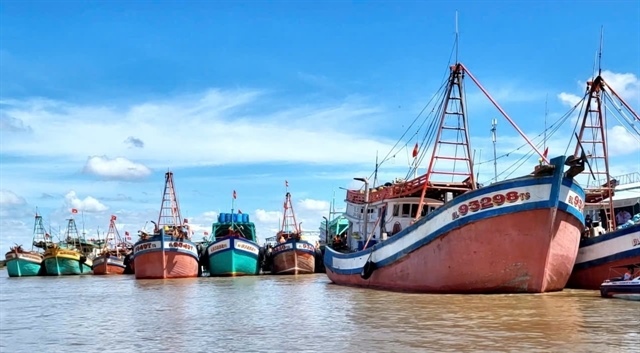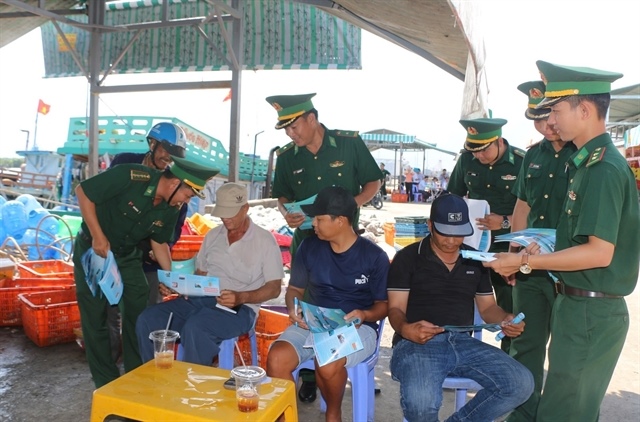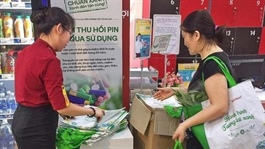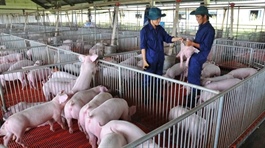Cà Mau steps up drive to remove European restrictions on fishing
Cà Mau steps up drive to remove European restrictions on fishing
As one of the nation’s four key fishing grounds, Cà Mau views the fight against IUU fishing as both an urgent and long-term mission.

Fishing vessels anchored at Gành Hào Fishing Port in Cà Mau Province. VNA/VNS Photo |
As the country’s only province bordered on three sides by the sea, and with more than 310 kilometres of coast and vast fishing grounds, Cà Mau has long identified fisheries as a key sector and a driving force for socio-economic growth.
With the European Commission still maintaining its “yellow card” warning against Việt Nam’s seafood exports due to illegal, unreported and unregulated (IUU) fishing, the southernmost province is intensifying efforts with a raft of stringent measures to ensure sustainable and responsible fisheries development.
As one of the nation’s four key fishing grounds, Cà Mau views the fight against IUU fishing as both an urgent and long-term mission.
By leveraging its rich resources and strong fishing fleet, the province has been able to maintain stable output while consolidating its role as a leading player in the fisheries economy.
Cà Mau now has 5,252 fishing vessels, including 1,948 boats 15 metres or longer, according to the province's Department of Agriculture and Environment.
Their catch so far this year totals 270,946 tonnes, equivalent to 75.19 per cent of the full-year target.
The province has six fishing ports, four of which – Sông Đốc, Rạch Gốc, Gành Hào, and Cái Đôi Vàm – meet standards for traceability and verification of seafood origin.
Traceability has been tightened with the issuance of 33 certificates confirming raw seafood sources totalling 385 tonnes and 42 certificates verifying the origin of 558.8 tonnes of seafood.
All vessels longer than 15 metres unloading at ports have their fishing logs, vessel monitoring system (VMS) data, catch volume, and species composition carefully checked.
Fishermen on board
Legal awareness campaigns have been a priority. Authorities report that all local fishermen have been briefed on regulations governing legal fishing, including Resolution 04 of the Supreme People’s Court on criminal penalties for illegal exploitation, transport and trade of seafood.
Ngô Văn Hùng, a vessel owner from Sông Đốc, said his family’s three fishing boats, including those over 15 metres, had monitoring equipment installed.
“We understand our responsibility and are committed to working with the authorities against IUU. Some still break the rules for short-term gain, which undermines collective efforts. I hope everyone raises their awareness so that fisheries can grow sustainably.”
Sharing the view, fellow fisherman Trần Minh Đặng added: “Illegal fishing in foreign waters is not only dangerous for crew and vessels but also detrimental to national interests. I always comply with regulations and will not trade long-term sustainability for short-term profit.”
Huỳnh Văn Nhật, another fisherman from Sông Đốc, said: “I remind my crew to operate only in Vietnamese waters, keep the monitoring system on and follow the law. Violations could cost us our boats and jeopardise Việt Nam’s efforts to lift the 'yellow card'.”
At the local level, authorities are equally resolute.
“Sông Đốc Commune has more than 2,000 fishing boats, and nearly all have installed monitoring devices," said Đỗ Văn Sử, chairman of the Sông Đốc Commune People’s Committee (Administration).
“We strictly ban ‘three-no’ vessels – those without registration, licences or monitoring equipment – from going to sea. We are also digitising all records to prepare for EC inspections.”

Fishing vessels anchored at Gành Hào Fishing Port in Cà Mau Province. VNA/VNS Photo |
Harnessing technology
In recent months the dissemination of IUU laws and regulations has been intensified through media outlets, social networks and direct community outreach, with more than 8,000 news items and reports produced.
Border Guard personnel have persuaded over 1,200 fishermen to sign commitments against violations, while more than 100 commune-level officials have been trained to use fisheries management software.
Cà Mau has pledged not to allow non-compliant vessels to set sail, and to punish violators, including officials found complicit.
Digital technology is being harnessed to manage fishing boats through integrated software and online databases, enhancing transparency in monitoring and reporting.
One critical area highlighted by the EC is effective law enforcement.
Since early 2024 Cà Mau has detected 39 vessels that lost signal for over six hours, penalised 11 of them, and identified 46 for crossing fishing boundaries.
A complete inventory of all 100 private fishing wharves has been digitised, with more than 40 wharf representatives and local officials trained in catch reporting.
Tô Hoài Phương, director of the provincial Department of Agriculture and Environment, stressed that the campaign against IUU was not a cosmetic exercise.
“Lifting the 'yellow card' is both a challenge and an opportunity to restructure our fisheries sector. Our efforts must be genuine, never perfunctory. By tightening fleet management and digital connectivity, we are paving the way for a disciplined, responsible and sustainable fisheries industry in Cà Mau.”
Countdown to inspection
Lê Văn Sử, deputy chairman of the Cà Mau People’s Committee, who heads the provincial anti-IUU task force, underlined the political dimension of the task.
“IUU prevention is not only a technical matter but also a political responsibility for every official and sector," he said.
“Failure to act decisively could have severe consequences for both our fisheries industry and the nation’s reputation. That is why we must stay highly focused, with tangible results achieved day by day.”
All agencies have been instructed to review progress, assign clear responsibilities and accelerate action plans, with particular emphasis on finalising vessel records, completing digital identification, controlling port entry and exit, and strengthening legal education.
With the EC’s fifth inspection mission expected by the end of 2025, regarded as the decisive opportunity for Việt Nam to remove the "yellow card", Cà Mau has prepared records that are well structured and digitised for submission.
Issues previously highlighted by the EC, such as fleet management, VMS compliance, port supervision and sanctions enforcement, are being rigorously addressed.
For Việt Nam, lifting the 'yellow card' is not just about avoiding economic losses in seafood exports to Europe, worth about VNĐ 5.5 trillion (US$220 million) in 2024, but more importantly about ensuring the long-term sustainability of fisheries, strengthening national credibility, and safeguarding maritime sovereignty.
- 09:05 18/10/2025























